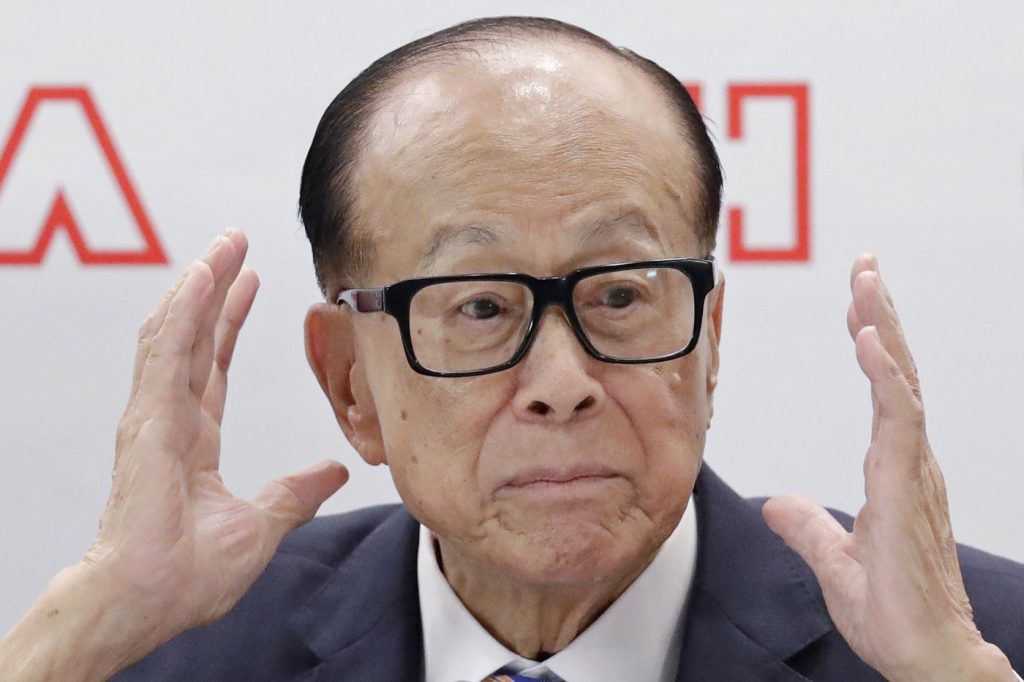HONG KONG (AP) - Hong Kong tycoon Li Ka-shing's business empire faces scrutiny as CK Hutchison Holdings announced its decision to sell its Panama Canal port assets to a consortium that includes the U.S. investment firm BlackRock Inc.. This move has reportedly angered Beijing.
In the past week, Beijing’s Hong Kong affairs offices have criticized the planned sale through local state-backed media, raising questions about the integrity of the deal. This situation underscores the challenges faced by Hong Kong businesses as they navigate the demands of allegiance to Beijing while pursuing their financial interests in the once-freewheeling Asian financial hub.
Li, Hong Kong's Richest Tycoon
Li Ka-shing, often referred to as "Superman," is one of the wealthiest individuals globally, with a net worth estimated at $38 billion according to Forbes. At 96 years old, Li retired from his position as chairman of CK Hutchison in 2018, passing leadership to his eldest son, Victor. However, he continues to hold substantial influence in Hong Kong's socio-economic landscape.
Li's success story mirrors that of Hong Kong's own development. His business interests span various sectors, including real estate, supermarkets, telecommunications, and utilities. His conglomerate owns international assets, such as the British pharmacy chain Superdrug and the European mobile phone operator Three.
A subsidiary of Hutchison has managed ports at both ends of the Panama Canal since 1997, a fact that contributed to former U.S. President Donald Trump's claims of Chinese interference in the operations of this critical shipping route.
Li's Relations with Beijing
Li's influence extends beyond business; he has engaged with top Chinese leaders and served on the elite committee responsible for selecting Hong Kong's leader. Analysts suggest that Communist Party leaders once recognized the importance of collaboration with business sectors to maintain Hong Kong's capitalist framework, vital for China’s economic development.
However, Li's business decisions have not been without criticism. Following his divestment of certain Chinese assets in 2015, he faced allegations of immorality from think tanks linked to the official Chinese news agency Xinhua. Additionally, during the pro-democracy protests in 2019, he was criticized by some pro-Beijing factions for appearing ambivalent about the unrest. In contrast, other business figures adopted a more assertive stance.
The Panama Ports Deal
On March 4, CK Hutchison disclosed its plans to sell its shares in Hutchison Port Holdings and Hutchison Port Group Holdings to a consortium that includes BlackRock's subsidiary, Global Infrastructure Partners, as well as Terminal Investment Limited, chaired by Italian shipping heir Diego Aponte.
If approved, the deal, valued at approximately $23 billion (including $5 billion in debt), would allow the consortium to manage 43 ports across 23 countries, including key ports at either end of the Panama Canal. Notably, the transaction does not involve ports situated in Hong Kong or mainland China. CK Hutchison has maintained that the deal is fundamentally commercial.
While the sale has garnered support from Trump, it has incited anger in Beijing. Commentary in a state-affiliated newspaper labeled the deal a "betrayal" and urged that the company consider its loyalties. Meanwhile, public sentiment on Weibo has shown a predominant trend of criticism towards Li.
Geopolitical Ramifications
Reports suggest that Chinese leaders might have been frustrated due to not being consulted prior to this deal. According to George Chen, managing director for Hong Kong at The Asia Group, Beijing’s disappointment stems from its limited time to formulate a response.
Given the strategic significance of ports, transactions involving them are often met with sensitivity. As the deal awaits approval from the Panamanian government, its implications remain uncertain amid potential pressure from Beijing on CK Hutchison to abandon the agreement.
Li's attempts to placate critics could involve utilizing the proceeds from the sale to support projects aligned with Chinese policies, particularly those focused on Hong Kong and mainland port development. Nonetheless, the unpredictability between private enterprises and the Chinese government poses challenges for business leaders.
The developments in Hong Kong's business landscape highlight the complexities inherent in navigating the balance between capitalism and political allegiance, particularly under the current heightened scrutiny of the region's autonomy.










